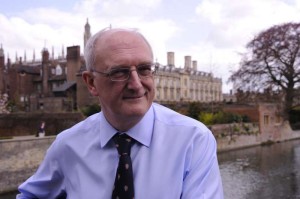Cambridge, the global University, is wooing Indian academics reports Anasudhin Azeez

Professor Sir Leszek Borysiewicz, the Vice-Chancellor of Cambridge University, will lead a senior University delegation to India for a series of meetings and events to interact with Indian academics and decision-makers. Consistently ranked as one of the world’s leading universities, Cambridge has strong historic and contemporary links with India.
Founded in 1209, the University comprises 31 autonomous Colleges, which admit undergraduates and provide small-group tuition, and 150 departments, faculties and institutions. Strengthening Cambridge’s engagement with India remains at the forefront of the University’s international strategy.
For more than 150 years the University of Cambridge has attracted scholars from India, with many of the country’s leading figures – academics, industrialists, scientists and politicians – having benefited from a Cambridge education. Academics and students from India have helped shape the modern world and define its global connectivity.
In recent decades Cambridge has been fortunate to attract significant investment to strengthen its partnership with India. Notable examples include the Jawaharlal Nehru Professorship of Indian Business and Enterprise, the Manmohan Singh Scholarships, the Tata Steel Professorship of Metallurgy and the Cambridge Hamied Visiting Lecture Scheme.
This will be the sixth visit to India by Professor Borysiewicz, a distinguished clinical researcher and virologist, since his appointment as Cambridge Vice-Chancellor in October 2010. The University is committed to achieving an ambitious expansion in the breadth and depth of research collaborations with Indian academics.
Indian institutions and Cambridge are becoming major partners in world-leading, cutting-edge research in areas of greatest importance to India’s continued development such as education, advanced manufacturing, nanotechnology, innovation, health and food security.
The University is hosting its biggest ever gathering of Indian alumni at the Taj Mahal Hotel in New Delhi on September 19, Friday. The event titled “Global Cambridge: India” is a day of lectures and panel discussions with eminent figures including Karan Thapar, Lord Bilimoria, Sir Mark Tully, MJ Akbar and British High Commissioner Sir James Bevan.
The Vice-Chancellor will open the new New Delhi head offices for Cambridge University Press India on September 20. The delegation will also visit Mumbai and Bangalore.
The mission of the University of Cambridge is to contribute to society through the pursuit of education, learning and research at the highest international levels of excellence. To date, 90 affiliates of the University have won the Nobel Prize.
Cambridge is a global university. Its 19,000 student body includes 3,700 international students from 120 countries, 250 of these being Indian. Cambridge researchers collaborate with colleagues worldwide, and the University has established larger-scale partnerships in Asia, Africa and America.
The University sits at the heart of one of the world’s largest technology clusters. The ‘Cambridge Phenomenon’ has created 1,500 hi-tech companies, 12 of them valued at over US$1 billion and two at over US$10 billion. Cambridge promotes the interface between academia and business, and has a global reputation for innovation.